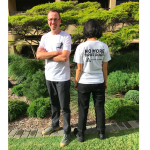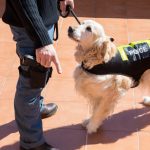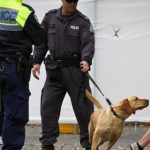Police Use of Strip Searches Skyrockets in NSW

At the 11 May Midnight Mafia festival at Sydney Olympic Park, NSW police officers searched 272 punters following an indication from a sniffer dog. Of these, 32 were charged with possession and eight were issued with new on-the-spot fines.
This means that police and their canine helpers got it wrong 85 percent of the time.
Now, this might seem like some sort of anomaly, but it’s not. Data obtained by the NSW Greens’ Sniff Off campaign going back as far as 2009, reveals that police have been consistently getting it wrong with drug dogs for around two-thirds to three-quarters of the time.
So, the large number of sniffer dog searches turning up no drugs is nothing new. But, what is a recent development is the increasing numbers of people attending festivals – or even getting off the train on their way home – that are being told to remove all of their clothes in front of strangers.
Authorities have repeatedly denied that any change in policy has occurred. However, NSW Greens MLC David Shoebridge revealed that while drug dog search numbers have dropped off recently, over the last eight years, the accompanying use of strip searches has risen by almost 267 percent.
Flawed and invasive
“The number of strip searches has increased year after year after year,” Mr Shoebridge said. In 2011, “the number of drug dog indications that escalated into a strip search was some 3 percent”. But, in 2018, “11 percent of all initial searches ended up with a strip search”.
“It’s a fairly dramatic change,” he added. “And it’s having a dramatic impact, especially on young people.”
The warrantless use of sniffer dogs in public places began prior to the 2000 Olympics. And as early as 2006, a NSW Ombudsman report slammed the program as ineffective, because it only resulted in drugs being found 26 percent of the time, and in most cases it was small amounts of cannabis.
“People are being subjected to literally thousands of searches in fairly flagrant breaches of their basic civil liberties on a program that has such a high failure rate,” Mr Shoebridge made clear, adding that it “shows just how aggressive and wrong-headed the government is on drug law enforcement.”
“Don’t be home too late.”
These days police can be found loitering with dogs around the front of music festivals. And taxpayers’ teenage daughters and sons are being taken into small tents alone and being asked to strip off, squat down and cough in front of armed and uniformed adult officers.
On most occasions, when the state perpetrates this act of indecency upon these kids, it has nothing to do with any illegal activity. Instead, the dirty logic is it’s somehow keeping the community safe.
“We know it’s traumatising young people. And we know that it’s seriously damaging the relationship between young people and the NSW police,” Mr Shoebridge told Sydney Criminal Lawyers. “This seems to be something that the police are quite comfortable with.”
“We’re currently going through the police standard operating procedures and training to see if there’s any recognition of the traumatic impact,” Shoebridge continued. “Our initial review suggests that police are not advised as to how traumatic strip searches can be, especially on young women.”
After a rough day at work
Over the last three months, NSW police have on three occasions set up screens on platforms at Central Station, so they can strip search commuters on their way home at the whim of a dog that by no fault of its own makes wrong indications the overwhelming majority of the time.
Citizens who don’t drive to their place of employment are being penalised by police who are subjecting them to an initial search by smell regardless of what they’ve been up to. And if they’re unlucky, they have to take off their clothes at the station all in the name of keeping the city safe.
Many officers aren’t even aware of the correct procedures for strip searches. At Midnight Mafia, a young man was strip searched because of the way he was chewing gum, while, in March, a 19-year-old woman was searched with a tent door half open at the Hidden festival.
Don’t consent to a search
The Redfern Legal Centre’s Safe and Sound campaign has the aim of not only lowering search numbers, but also changing the police strip search protocol wording in the Law Enforcement (Powers and Responsibilities Act) 2002 (the LEPRA), as at the moment, it’s too “vague and legalistic”.
Section 33 of the LEPRA outlines that a strip search must be carried out in an enclosed area, body cavities should never be checked, the search shouldn’t involve the removal of any clothing unnecessarily and an officer should never touch an individual.
If you are subjected to a search, it’s best to politely comply with an officer’s instructions, but make sure you tell them that you don’t consent to the search, as later down the track, if it’s found the search was carried out illegally, consent actually overrides that finding and makes the search legal.
All’s not lost
According to Shoebridge, the Berejiklian government – with its new police minister David Elliott – hasn’t wavered in its support of the measures NSW police are currently employing. This is hardly surprising considering the reigning premier’s consistent tough on crime and drugs rhetoric.
Despite figures revealing that crime rates in NSW are at some of their lowest in the last 20 years, the Liberal Nationals government revealed last November that it’s investing in the largest increase in NSW police numbers in 30 years. This involves the employment of an extra 1,500 officers.
Although, Mr Shoebridge believes that when it comes the ever-increasing use of strip searches, the tide is turning. The Greens justice spokesperson explained that public attitudes are shifting, while the mainstream media is providing much more critical analysis of police operations.
“It’s going to require constant scrutiny in parliament, continuing to get the data and stories out into the public domain, and it’s going to require continued pressure on the NSW Police Force,” Mr Shoebridge concluded.
“This is an illegitimate form of policing. We need to highlight that and then change it.”







